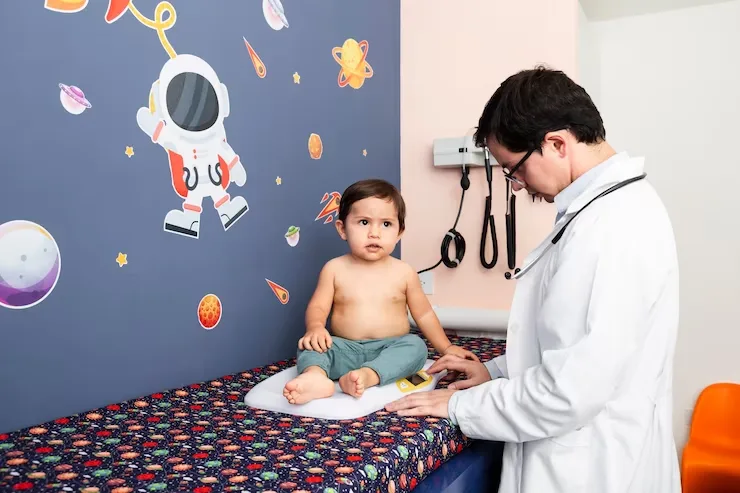Introduction
Pediatric diseases, their causes, symptoms, and treatments. Learn how to protect your child’s health with expert insights and care tips. Pediatric diseases are illnesses and conditions that specifically affect children from birth all the way through adolescence. This includes a wide range of issues, from common childhood infections like chickenpox to more complex chronic disease like asthma or diabetes . Just like adults, children can also experience birth defects, nutritional disease, and even cancer. Understanding these various conditions and their causes is crucial for ensuring the health and well-being of our future generation. Childhood is a precious journey of growth and development. However, this period can also make you vulnerable to various illnesses and diseases. Understanding these pediatric conditions is crucial for parents, caregivers, and healthcare professionals to ensure the well-being of children.
Types of Pediatric Diseases:
Pediatric diseases encompass a wide spectrum of conditions, categorized based on their origin and impact:
- Infectious Diseases: These highly contagious illnesses are caused by viruses, bacteria, or parasites. Common examples include:
- Childhood immunizable diseases: Measles, mumps, rubella (MMR), diphtheria, tetanus, polio, and chickenpox are preventable through vaccination.
- Respiratory Disease: cough, Pneumonia, and the common cold are prevalent, primarily affecting the respiratory system.
- Gastrointestinal Disease: Rotavirus, diarrhea, and food poisoning cause symptoms like vomiting, nausea, and abdominal discomfort.
- Chronic Disease: These are long-term illnesses requiring ongoing management and often early intervention. Examples include:
- Asthma: A chronic inflammatory airway disease causing breathing difficulties.
- Diabetes : A metabolic disorder affecting blood sugar regulation.
- Autoimmune diseases: Conditions where the immune system attacks the body’s own tissues, like juvenile arthritis.
- Congenital Malformations: These are birth defects present from birth, affecting various organs and systems. Examples include:
- Heart defects: These are structural abnormalities of the heart and its vessels.
- Cleft lip and palate: This birth defect involves incomplete formation of the upper lip or roof of the mouth.
- Down syndrome: This chromosomal condition causes intellectual and developmental delays.
- Nutritional Disease: Inadequate intake of essential nutrients can lead to various health problems, including:
- Iron deficiency anemia: This condition occurs due to low iron levels, causing fatigue and weakness.
- Vitamin D deficiency: This can impact bone health and development.
- Mental Health Disorders: Children are not immune to mental health challenges. Common examples include:
- Attention deficit hyperactivity disorder (ADHD): Characterized by inattention and hyperactivity/impulsivity.
- Anxiety disorders: Excessive worry and fear impacting daily life.

Causes of Pediatric Diseases:
The causes of pediatric diseases vary depending on the type:
- Infectious Disease: These are transmitted through contact with an infected individual, contaminated surfaces, or food and water.
- Chronic conditions: These can be caused by genetic disease, environmental exposures, or a combination of both.
- Congenital malformations: These may occur due to genetic mutations, maternal health concerns during pregnancy, or environmental factors.
- Nutritional deficiencies: These arise from inadequate intake of essential nutrients through diet or due to absorption issues.
- Mental health conditions: A combination of genetic, environmental, and psychological factors can contribute.
Symptoms of Pediatric Diseases:
Symptoms of pediatric diseases can vary significantly based on the specific illness. However, some general warning signs may require immediate medical attention:
- Fever: An elevated body temperature can indicate infection or inflammation. A temperature exceeding 100.4°F (38°C) in infants or 102°F (38.9°C) in older children warrants medical evaluation.
- Coughing and congestion: These often point to respiratory infections. Rapid breathing, wheezing, or retractions (pulling in of the chest muscles) require immediate medical attention.
- Vomiting and diarrhea: These can be signs of GI illnesses or foodborne illnesses.These symptoms can lead to dehydration, especially in young children.
- Earache: This can indicate an ear infection.
- Painful urination: This can be a sign of a urinary tract infection (UTI).
- Skin rash: This can be due to various conditions, including allergies, infections, or eczema.
- Changes in behavior or appetite: These can be subtle signs of underlying illness.
Diagnosis of Pediatric Diseases:
Early diagnosis of pediatric diseases is crucial for effective treatment and preventing complications. This process may involve:
- Detailed medical history: Doctors will inquire about the child’s symptoms, development, family history, and lifestyle.
- Physical examination: A thorough physical examination is needed to assess overall health and identify potential signs of pediatric disease.
- Diagnostic tests: Depending on the suspected condition, tests like blood tests, urine tests, stool tests, imaging studies (X-rays, ultrasounds), or specific tests for infections might be ordered.
Treatment of Pediatric Diseases:
Treatment for pediatric diseases depends on the specific diagnosis and severity. Common treatment approaches include:
- Medications: Antibiotics for infections, medications to manage chronic conditions like asthma or diabetes, and pain relievers are often prescribed.
- Surgery: In some cases, surgery may be necessary to correct congenital malformations or treat specific conditions.
- Dietary modifications: Nutritional counseling and dietary changes can address nutritional deficiencies and improve overall health.
- Therapies: Physical therapy, occupational therapy, or speech therapy can be beneficial for managing chronic conditions and supporting development.

Prevention of Pediatric Diseases:
Several measures can help protect children from various illnesses:
- Frequent handwashing: This is the single most effective way to prevent the spread of germs.
- Vaccinations: Staying up-to-date on vaccinations protects children from vaccine-preventable diseases.
- Healthy diet and exercise: Promoting a healthy lifestyle strengthens the immune system.
- Safe sleep practices: Following safe sleep recommendations reduces the risk of Sudden Infant Death Syndrome (SIDS) and other complications.
- Regular checkups: Regular visits to the pediatrician allow for early detection and intervention of any potential issues.
Conclusion:
Understanding common pediatric diseases empowers parents and caregivers to be proactive in safeguarding their children’s health. By recognizing symptoms, seeking timely medical attention, and implementing preventive measures, we can ensure a healthy and happy future for our little ones. Remember, this information is for general knowledge only and should not replace advice
